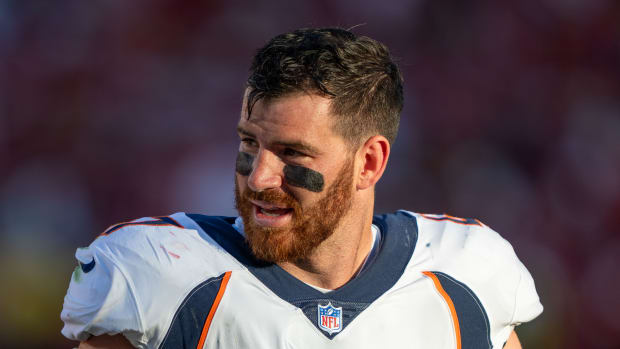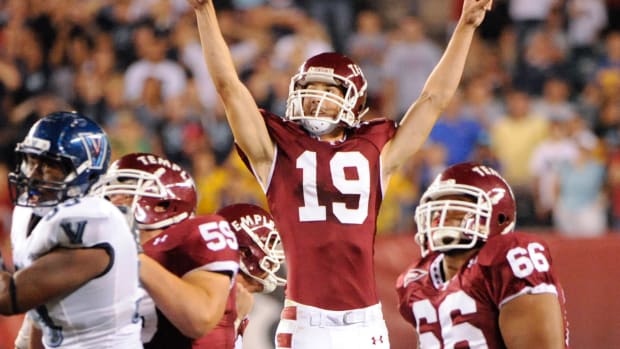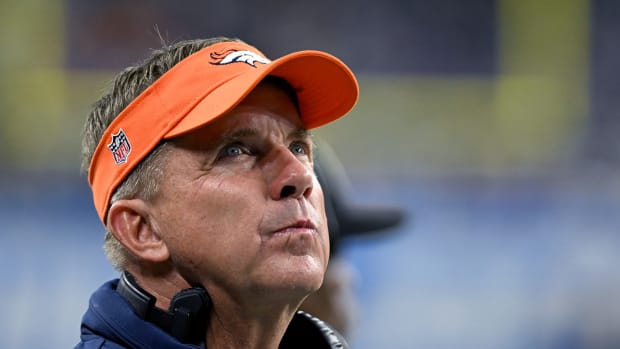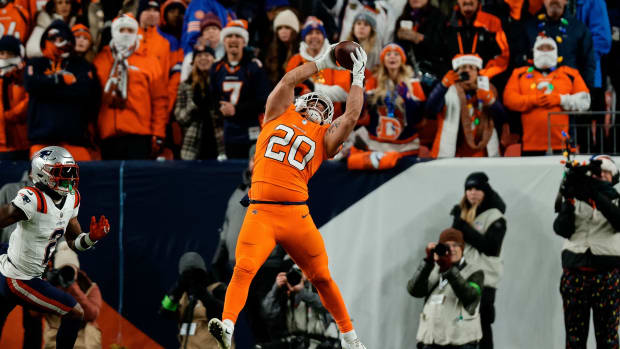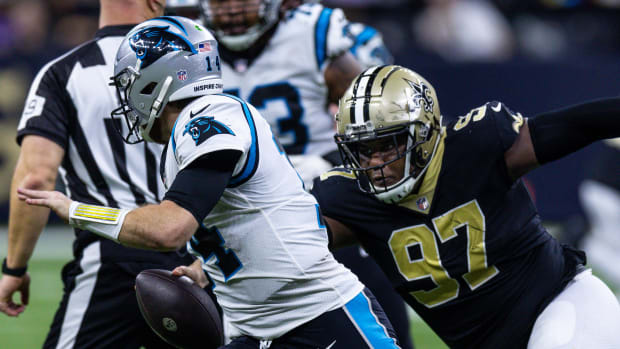Here's What a Phillip Lindsay Contract Extension Might Look Like for Broncos
A couple of weeks ago, Denver Broncos general manager John Elway suggested that he might talk to running back Phillip Lindsay about a new contract — remarks that might have raised some eyebrows.
After all, Lindsay will enter the third year of his undrafted free agent contract, then become a restricted free agent in 2021, at which point the Broncos could place a second-round restricted free-agent tender on him for a little more than $3M, then allow him to hit unrestricted free agency in 2022.
And that's because running back isn't a premium position — in fact, it's one of the lowest in terms of importance. When you watch backs that get drafted in later rounds — or, in the case of Lindsay, go undrafted — who produce quality numbers, the argument goes that there's no point in drafting a running back in the first round and paying top dollar for one who hits free agency.
While there is plenty of truth to that view, when a running back outperforms his rookie contract, the view that those backs should just play under that cheap contract sends a message that they are expendable. That's not a good message to send to players, because they get the impression that their services aren't valued.
Of course, the fact that most running backs don't remain dominant for long is a reason not to commit too much over time. But in the case of Lindsay, it's worth asking if the Broncos, and Broncos fans, should just simply view him as a cheap player who we should keep for cheap, then send him on his way after four seasons.
It's not often that undrafted players get extended after two seasons — though it's not unheard of. The Jacksonville Jaguars gave WR Allen Hurns an extension after two seasons, which raised eyebrows because the Jaguars could have kept him on his three-year deal, then apply the RFA tender, then extend him after that if they wished.
In Hurns' case, though, he plays a position that carries higher value. If quarterbacks are the top tier and pass rushers are the second, then wide receivers share the third tier with cornerbacks and offensive tackles. Better to keep a higher-tier player on a cheaper deal while you can, but know that you can reward him down the road.
With Lindsay, I think a better argument exists to extend him now, but for more than the fact that he's outperformed his contract and draft status. Because he plays running back, and running backs don't have long careers on average, it's better to pay him more money now, so you can get the most out of a bigger contract while he doesn't have a lot of seasons behind him.
But how much should Lindsay get? That's a good question.
A Look at RB Money Across the League
You want to reward him for his production, but you don't want to overpay. And when you look at most running back contracts, it's tough to get into comparisons, but here are the APY salaries for the highest-paid backs in the NFL on veteran contracts who are still under contract for 2020 (rookie contracts for Saquon Barkley and Leonard Fournette are excluded from this list).
- Ezekiel Elliott: $15M
- Todd Gurley: $14.375M
- Le'Veon Bell: $13.15M
- David Johnson: $13M
- Devonta Freeman: $8.2M
- Jerick McKinnon: $7.5M
- Duke Johnson: $5.2M
- Mark Ingram: $5M
- Dion Lewis: $4.95M
- Gio Bernard: $4.85M
I think we can safely rule out the idea of Elway giving Lindsay an extension that surpasses $10M APY — that's simply too much, especially because Lindsay, while a talented player, isn't a workhorse back.
Lindsay is more comparable to Devonta Freeman, in that he can be the primary back in a rushing attack, but he needs another back who complements him well and can take the load off him in certain situations. With that said, I don't think Elway will want to exceed what Freeman received — Freeman got more than $18M fully guaranteed and that's a bit much.
However, if Elway is serious about offering Lindsay an extension, I'm not sure he can argue that Lindsay should accept $5M APY, putting him in the backs on the bottom-5 of the list. Those backs are either complementary options behind another back or, while they may be the primary guy, don't have the potential for big plays like Lindsay does.
The McKinnon Comparison
That leaves us with McKinnon — a back who has never even taken a snap for the Niners since signing his contract, thanks to injuries. But setting aside the injury factor, plus the fact that McKinnon never established himself as a primary back (even if he was thought to be a good fit for Kyle Shanahan's scheme), the money McKinnon received is likely the measuring stick Elway may have to use.
McKinnon received $11.7M in fully guaranteed money and has $2.6M of his 2020 base salary guaranteed for injury. If the Broncos gave Lindsay $12M in fully guaranteed money in an extension, that would amount to more than three times what Lindsay will get in his current 2020 base salary and the second-round RFA tender in 2021.
Is Lindsay worth it? For some, it depends on how much they value running backs. For others, they'll see it as a way to reward Lindsay for a job well done the past two seasons.
Term Limits
There's also the question of contract length. Would it make sense for the Broncos to give Lindsay a shorter deal, then re-evaluate? On one hand, a shorter deal means the Broncos carry less risk in having to keep Lindsay around should something happen to him. On the other hand, if Lindsay keeps producing at a high level, the Broncos would find themselves with a decision about an extension sooner.
Some will also wonder about the APY salary. With McKinnon averaging $7.5M per year on his deal, fans might ask if Lindsay and his agent — assuming they don't intend to seek a top-five contract — try to push for $8M per year or more, perhaps trying to approach Freeman's deal. That may be more than the Broncos want to give him.
Personally, I am fine with the Broncos giving Lindsay more money over the next two seasons, but not to overpay. I would say a fair deal for Lindsay would be for three years, with two seasons of fully guaranteed money. The Broncos would thus say that they intend to keep Lindsay around for two seasons, only on a higher salary.
The Broncos could give Lindsay more in full guarantees than McKinnon got, then have a team option in the third year that would guarantee him a portion should the team exercise the option. (The team option in the final year of a contract has become a standard for the Broncos.)
By making it a deal that would keep him around for two seasons, but give an out on the third year, the Broncos could get out of the contract in 2022 — just when Courtland Sutton will be due an extension. The Broncos can re-evaluate Lindsay at that point, then keep him or move on, depending on their cap situation and his performance level.
The Takeaway
There will be debate as to whether or not the Broncos should give Lindsay more money at all. But it may be smart business for Elway to show that he doesn't simply want to treat running backs as expendable. Giving Lindsay more money, despite the 'go cheap' options available to him, would send a message to players that he's willing to do right by them, even if he isn't going to give them everything they want.
I wouldn't expect a Lindsay extension to happen quickly — after all, priority will go to any Broncos with expiring contracts who Elway wants to retain. But once that's done, if Elway is still serious about giving Lindsay more money, it will be interesting to see how the GM goes about an extension.
Follow Bob on Twitter @BobMorrisSports and @MileHighHuddle.

